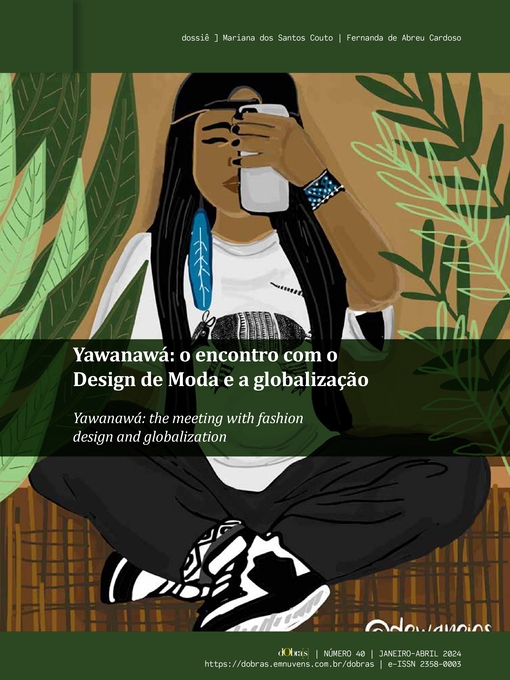Yawanawá: the meeting with fashion design and globalization
DOI:
https://doi.org/10.26563/dobras.i40.1683Keywords:
Fashion Design, Globalization, Yawanawás, National IdentityAbstract
This article presents a theoretical discussion and a critical analysis of the Yawanawá amazonian indigenous people´s relationship with globalization in the political, social and economic spheres. In addition, it explores the dialogue established between this indigenous people and Fashion Design, with a specific focus on its collaboration with the carioca brand FARM, and the implications revealed by this connection. As theoretical references are used the authors Néstor García Canclini, Renato Ortiz and Alberto Cipiniuk, besides being done an analysis of some partnership’s products and their presentation as well as an observation in loco of one of the brand’s international stores. We seek to investigate the dynamics of this relationship as a central object to understand the issue of identity and “brazilianness” as construction and value of differentiation in a fashion product, as well as the discursive power of a brand in the process of internationalization. Through this research we seek to understand how the Yawanawá people position themselves in the face of the challenges imposed by globalization, addressing the social, political and economic impacts that this relationship with the globalized world creates. We also investigate how a brand uses this relationship to generate visibility as well as to demonstrate social responsibility in its discourse and mark its positioning. When considering these aspects, the article seeks to shed light on the complexities of this relationship and its possible implications for the cultural identity of the Yawanawá people and the discursive power of the FARM fashion brand in a globalized scenario.
Downloads
References
CANCLINI, Néstor. Culturas Híbridas: estratégias para entrar e sair da modernidade. São Paulo: Editora USP, 2019.
CARDOSO, Fernanda de Abreu; CENTENO, Gláucia. BRASILIDADES – o design brasileiro e as representações da identidade nacional. Inovação, Estudos e Pesquisas – Reflexões para o Universo Têxtil e de Confecção, pp. 41-54 - Estação das Letras, São Paulo, 2012.
CHAUÍ, Marilena. A ideologia da competência. Belo Horizonte: Editora Autêntica, 2014.
CIPINIUK, Alberto. Design – O livro dos porquês. Rio de Janeiro: Editora PUC RIO; São Paulo: Ed. Reflexão, 2014.
COMISSÃO PRÓ-ÍNDIO DO ACRE. Disponível em: < https://cpiacre.org.br/ >. Acesso em 03 jul. 2023.
FARM. Disponível em: < https://www.farmrio.com.br/ >. Acesso em 27 jul. 2023.
GIDDENS, Anthony. As consequências da modernidade. Trad. Raul Fiker. São Paulo: Editora Unesp, 1991.
GRUPO SOMA. Disponível em: < https://www.somagrupo.com.br/ >. Acesso em 03 jul. 2023.
HOBSBAWN, E. & RANGER, T. A Invenção das Tradições. São Paulo: Editora Paz e Terra S.A, 1997.
ISA – INSTITUTO SOCIOAMBIENTAL. < https://www.socioambiental.org/pt-br > Acesso em: 10 jul. 2023.
MAKHLOUF, Alexandre. Cidadã do Mundo. Revista Gol, número 198, pp.86-91, set. 2018.
MICHI, Leny Nayra. O papel do estado nas parcerias comerciais entre povos indígenas amazônicos e empresas na comercialização de produtos florestais não madeireiros. São Paulo, 2007. Dissertação de mestrado – Programa de pós-graduação em Ciência Ambiental, Universidade de São Paulo.
NAVEIRA, Miguel Alfredo. Yawanawá: da guerra à festa. Florianópolis, 1999. Dissertação de mestrado – Programa de pós-graduação em Antropologia, Universidade Federal de Santa Catarina.
NYE, J. Soft Power: The Means to Success in World Politics. Cambridge: PublicAffairs (2005).
ORTIZ, Renato. Imagens do Brasil. Revista Sociedade e Estado. Volume 28, número 3, pp. 609-633, Setembro/Dezembro 2013. DOI: https://doi.org/10.1590/S0102-69922013000300008
ORTIZ, Renato. Cultura Brasileira e Identidade Nacional. São Paulo: Editora Brasiliense S.A, 1985.
PIB SOCIOAMBIENTAL. “Povo: Yawanawá”. Disponível em < https://pib.socioambiental.org/pt/Povo:Yawanaw%C3%A1 >. Acesso em: 10 jul. 2023.
RESET. Do Acre para o mundo: O líder que colocou os Yawanawá no mapa da moda Disponível em: <https://www.capitalreset.com/do-acre-para-o-mundo-o-lider-que-colocou-os-yawanawa-no-mapa-da-moda/> Acesso em 29 de jul. de 2023
REVISTA ELETRÔNICA A FOLHA DE S.PAULO. Sebastião Salgado na Amazônia. Arte Folha Uol. 2017. Disponível em: < https://arte.folha.uol.com.br/ilustrada/2017/sebastiao-salgado/yawanawa/o-povo-ressuscitou-cresceu-e-ganhou-a-aldeia-global/ > Acesso em: 27 de jul. 2023.
REVISTA ELETRÔNICA A FOLHA DE S. PAULO. Urucum transforma a vida em comunidade. Arte Folha Uol. Disponível em <https://www1.folha.uol.com.br/fsp/brasil/fc2611200031.htm >. Acesso em 08 jul. 2023.
REVISTA HYPENESS. Disponível em: < https://www.hypeness.com.br/2018/04/empoderamento-feminino-e-protecao-da-amazonia-inspiram-nova-colecao-da-farm-em-parceria-com-indias-yawanawa/ > Acesso em 03 fev. 2023.

Downloads
Published
How to Cite
Issue
Section
License
Copyright (c) 2024 Mariana dos Santos Couto, Fernanda de Abreu Cardoso

This work is licensed under a Creative Commons Attribution-NonCommercial-ShareAlike 4.0 International License.
The copyrights of the works published in this journal belong to the author, and dObra[s] holds the rights of first publication. Due to their publication in this open access journal, any work here is free to use, with its own attributions, in educational and non-commercial applications.









